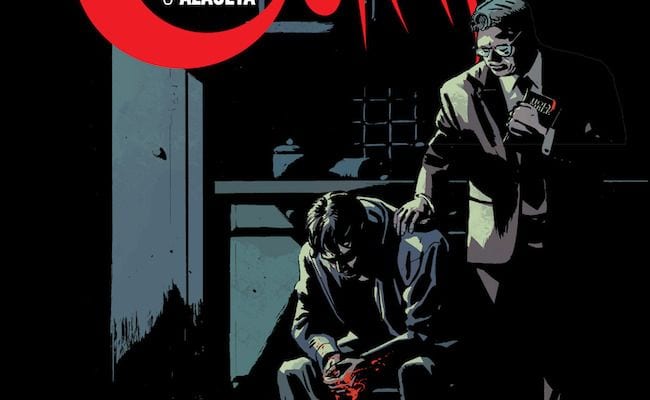
The second issue of Robert Kirkman’s Outcast, “From the Shadows It Watches”, hits the perfect tone for small-town horror, but not without a sense of anticipation before cracking the cover open. It’s not anticipation borne out by the narrative weight of the first issue, as much by can this sleek rural story about demonic possession succeed in finding itself an audience. There’s a lot riding on this second issue, pre-orders for the first outpaced pre-orders for the issue of Walking Dead for that same month. And if you read Outcast #1, you’d have found that Kirkman and artist Paul Azaceta certainly delivered, exceeded expectations even. But, can the story continue? And moreover, can it find its audience?
If you’ve missed out the opening (and if you haven’t read Outcast #1, you have missed out), Outcast is the story of Kyle Barnes; the victim of child abuse at the hands of his mother, who grew up to batter his wife and daughter (leaving his daughter in a coma for a week), who ended up never leaving town and living in the broken-down old house at the end of the street, the one the boarded up windows. Except of course, Kyle didn’t really beat his daughter. He was forced to physically intervene when his wife did. And instead of throwing her under the bus, took the blame on himself. But in a close-knit small-town community like Kyle’s, some residents have reached for a preternatural explanation of his mother’s (and in their eyes) Kyle’s own behavior—demonic possession.
The first issue brought us to a point where Kyle was on the cusp of accepting that there might be a supernatural explanation, that both his wife, and his mother before her might have been the subject of demonic possession. This perfectly describes Kirkman’s creative intent with this project, where he wants to escape the broader debate of whether or not demonic possession actually exists, and instead explore it as a sociocultural phenomenon. In the afterword to the first issue, Kirkman writes:
The scariest things are real. Ever see Jaws? Or Texas Chainsaw Massacre? Or The Exorcist?
Yes… even that last one. Very real, very scary.
There is evidence that supports the possibility that demonic possession is very much real. I don’t want to use this page to get into a larger religious debate, but I know there are a lot of firsthand accounts out there that paint a very strange and terrifying picture. So without making this a pro-religion or anti-religion book in any way… my goal is to explore this phenomenon in a fictional story… in an effort to look at it from all angles and y’know… entertain people.

But of course, bringing Kyle to that realization is nothing but pure set-up. That’s really just where the story begins. Because with Outcast Kirkman has crafted as fine a horror as could possibly be perceived in his chosen genre. Small-town horror isn’t a horror story set in a small town, it’s small-town horror because the nature of not living in a massive urban sprawl contributes uniquely to the horror of the tale being told. It is a grand literary tradition that Kirkman invites us into and challenges us with. It is Stephen King’s naturalistic Americana that somehow without our noticing it, easily glides into horror (remember IT?). But behind that, standing on the shoulders of giants, it is also Henry David Thoreau and Ralph Waldo Emerson. And a dark reflection of Walt Whitman. And by a more recent cultural reference, the same strange funerary texture as the HBO drama from the early Aughts, Six Feet Under.
And it’s with this creative intent that “From the Shadows It Watches” really sets the tone for the series as a whole. There’s arguably only one moment infused with the supernatural (in the church where the Man in the Black Hat confronts the Reverend, although there’s a coda with the Man in the Black Hat at Kyle’s mother’s hospital bed). But the real horror that comes shining through is the social horror. Of Kyle assuming the role of pariah to shield his wife. Of Kyle forging a temporary truce with his adoptive brother-in-law to beat down the man who abused his adoptive sister. And then having a drink with his brother-in-law despite the hatred that stems from Kyle assumedly having beaten his own daughter. What Kirkman offers is the social complexity of the best kind of small-town, family drama, seasoned with the supernatural. The horror on offer, is the horror of having to outlive ancient history, especially when that history is faked.
With its second issue, Outcast is proven to be the finest example of small-town horror blended with family drama. It’s weighty, literary, entirely sober, and something worth delving into and reading and rereading. Once it’s collected, you’ll want to buy the hardback, not to rest it on your shelf and point it out to guests and friends alike, but because the heavier book will better approximate the weighty themes.


![Call for Papers: All Things Reconsidered [MUSIC] May-August 2024](https://www.popmatters.com/wp-content/uploads/2024/04/all-things-reconsidered-call-music-may-2024-720x380.jpg)



